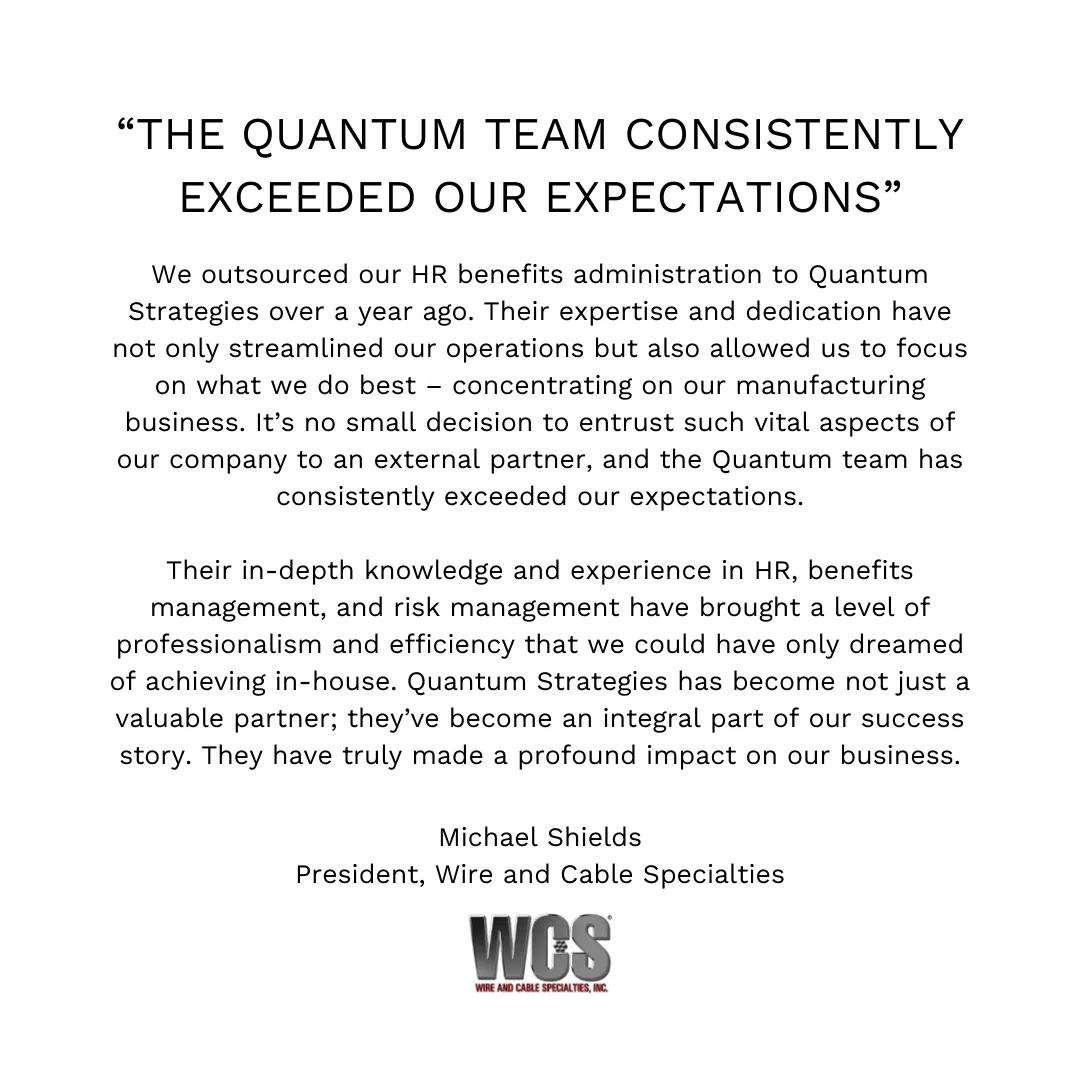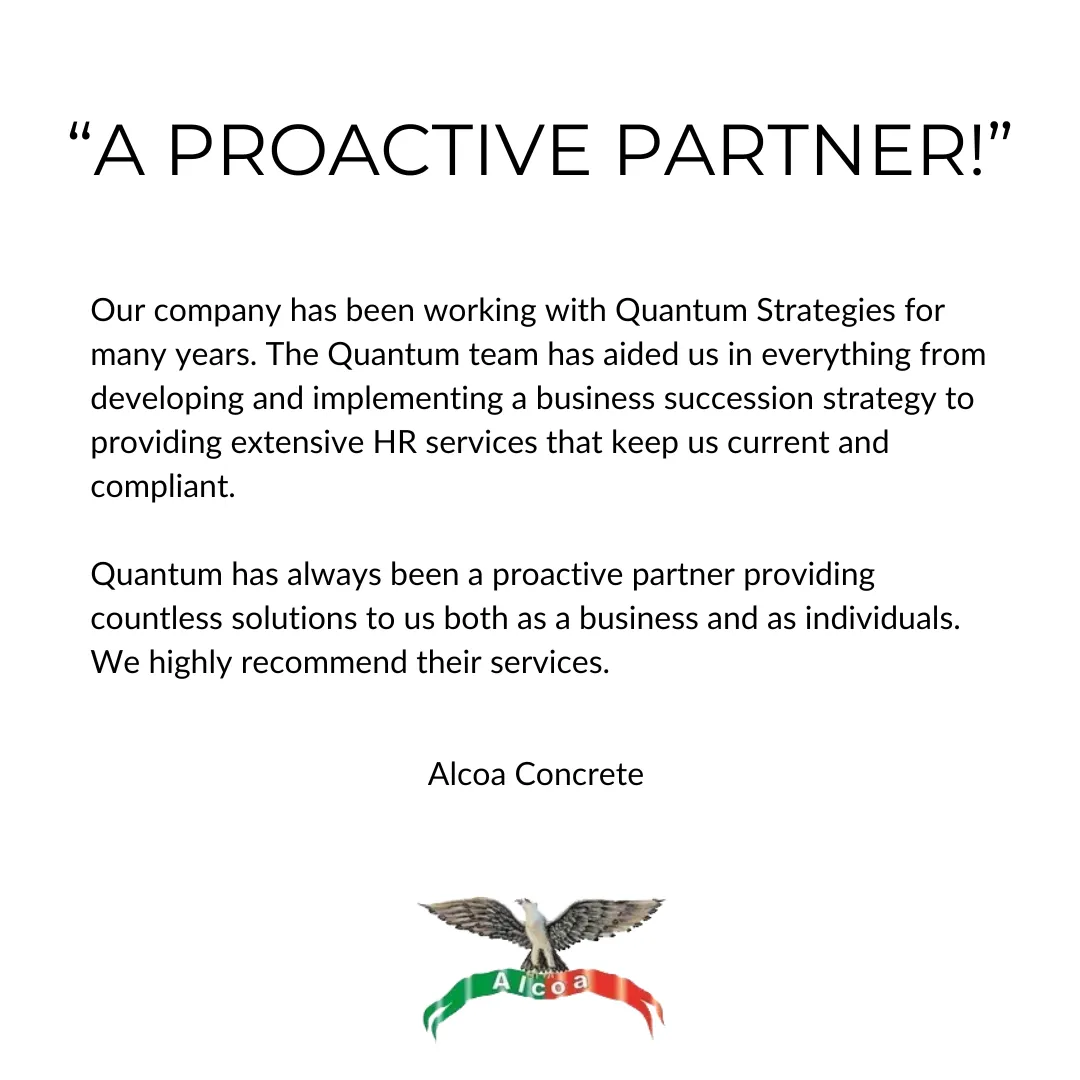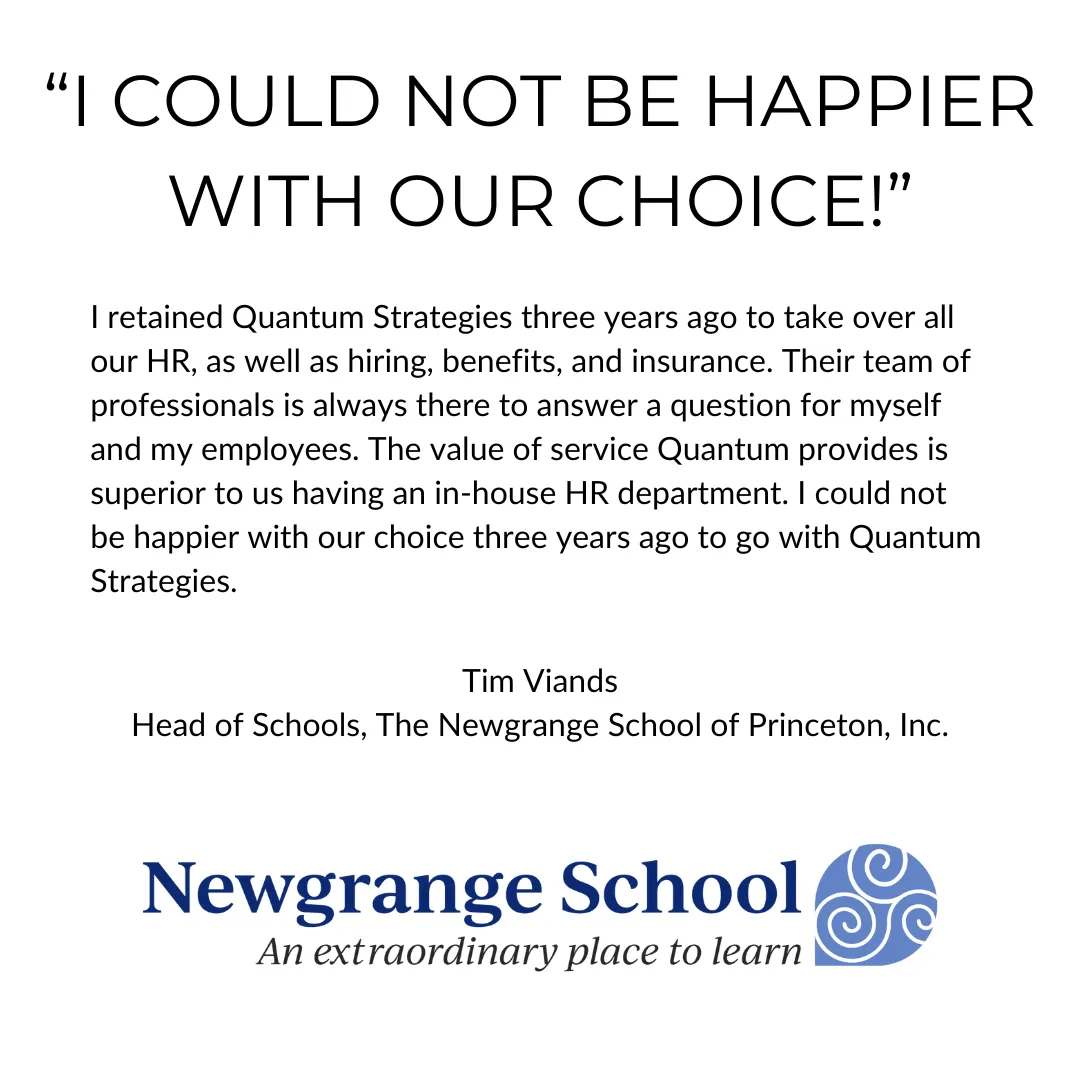Tailored HR Solutions as Unique as Your Business
Expert consulting and service to elevate your HR from a headache to a value driver.
Does Your HR Function Make the Grade?
Take our 5-minute quiz and evaluate the effectiveness of your HR function.

How We Help
We Focus on Your HR Needs,
So You Can Focus on Your Mission.
At Quantum Strategies, we understand that effective human resource management is the cornerstone of every successful business, regardless of size. Our mission is to provide tailored HR solutions that align perfectly with your unique business needs and growth stage.
Our Services
Navigating Change with Confidence: Quantum Expert HR Solutions
From Policy Assistance to Leadership Succession Planning, Quantum Strategies is Your Ultimate HR Resource to Solve Your Business Challenges.
HR Operational
Assessments
Unlock the full potential of your HR department. Our collaborative approach brings clarity and efficiency to your HR operations, providing a thorough analysis of your department's structure, costs, effectiveness, and needs.
Comprehensive Analysis: Detailed evaluation of your organization, workgroups, and individual roles for optimized efficiency.
Objective Insights: Receive a clear blueprint highlighting your HR department's strengths, weaknesses, and gaps.
Strategic Recommendations: Actionable plans focusing on technology utilization, communication enhancement, and leveraging department strengths.
HR Consulting and Managed Services
Tailored to align with your unique needs, our HR consulting and managed services enhance operational efficiency and effectiveness, allowing you to focus on your core mission while we optimize your HR investment.
Expert Supplemental Support: Strengthen your existing HR team with specialized expertise to navigate complex HR landscapes.
Personalized, Agile Solutions: Customized services for organizations with or without HR teams, adaptable to your specific requirements.
Goal-Oriented, Clear Communication: Delivering precise, actionable strategies that align with your organization’s goals and ensure successful execution.
Custom HRIS Design and Integration
Revolutionize your HR data management. Our team will evaluate your current human resources technology stack, offer recommendations, and then integrate your new and existing systems with our cutting-edge technology, ensuring seamless data flow and optimized operational efficiency.
Seamless Integration: Connect legacy systems with modern platforms for streamlined data management.
Tailored Design: Custom HRIS solutions uniquely crafted to meet your specific business needs.
Advanced Analytics: Leverage data-driven insights for strategic decision-making and operational excellence.
“Successfully steering through the specialized HR challenges within organizations of all kinds demands expert understanding, strategic planning, and precise implementation. With comprehensive knowledge of these challenges and the right solutions, your business can stay focused and successful in their vital missions.”
William J. Rizzo

Who we Are.
We Focus on Your HR Needs,
So You Can Focus on Your Mission.
At Quantum Strategies, we recognize that proficient management of human resources is fundamental to the success of any enterprise, irrespective of its scale. Our objective is to deliver customized human resource solutions that are in perfect harmony with your distinct business requirements and developmental phase.
Constant Improvement
Commitment to Customers
High Level Of Knowledge
Best Service You Can Get

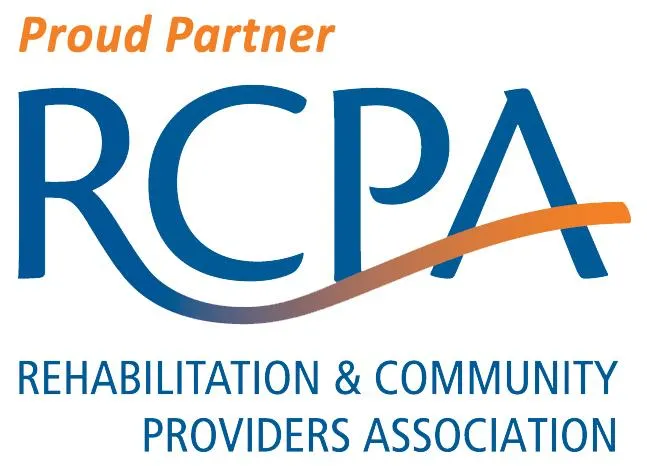
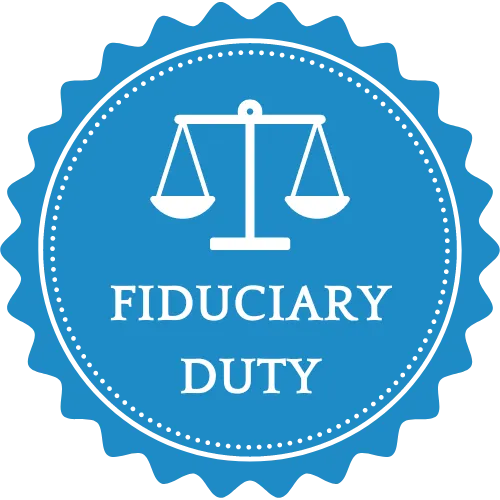
Why Choose Us
A True Partner to Solve Your Most Complex HR Challenges.
Empowering HR Innovation and Compliance
Commitment to 100% Client Satisfaction
People-First Approach

Peace of Mind:
Handle ongoing compliance with ease

Employee Satisfaction:
Build a positive workplace with engaged employees

Strategic Confidence:
Drive strategy with advanced analytics

Leadership Development:
Equip your team with the tools to lead

2,245 +
Happy Clients

25 +
Years Of Experience

120 +
Professional Team
Testimonials
The Quantum Commitment - 100% CLIENT SATISFACTION!
At Quantum, we understand that your satisfaction matters most, and The Quantum Commitment is our way of putting that understanding into action. Experience the difference with a team that is dedicated to making your satisfaction the cornerstone of our service. Because when you choose Quantum, you choose excellence, reliability, and a commitment to exceeding your expectations every time.
Our Resources
Unveiling Proven Strategies and Insights.
Discover actionable tips, expert advice, and industry insights to fuel your journey towards success.

Fostering a Psychologically Safe Workspace
As we navigate the complexities of the post-pandemic world, the importance of mental health in the workplace has surged to unprecedented levels. According to research from the
American Psychological Association, 81% of employees are now actively seeking workplaces prioritizing mental well-being.
Key Challenges Faced by Human Resources in Nonprofit Organizations
The nonprofit sector brings its own set of specialized difficulties, especially in the area of human resources (HR). Although these difficulties may share some common ground with those in the for-profit industry, they possess unique characteristics that require special attention from nonprofit leaders.
FOUND THESE HELPFUL?
Explore Additional Articles and Resources In Our Blog

The Evolving Role of HR: 15 Challenges and How to Overcome Them
Contents
The Importance of Addressing HR Challenges
15 Challenges Facing HR Managers
Attracting and Retaining Top Talent
Keeping Employees Motivated and Engaged
Adapting to Technological Changes
Managing Labor Laws and Regulatory Compliance
Monitoring and Improving Employee Performance
Maintaining a Positive Company Culture
Ensuring Adequate Training and Development
Making Pay Structures Fair and Equitable
Developing Succession Plans and Leadership Pipelines
Supporting Mental Health and Well-being
Transforming HR into a Strategic Business Function
Closing the Skills Gap and Preparing for the Future
Balancing Flexibility and Organizational Needs
Managing Middle Manager Burnout
Key Takeaways

Introduction
When you think of Human Resources (HR)? For some people, it's conflict management; for some, it's recruiting; and for some, it's benefits and compensation. But HR encompasses all those roles and many more. There are many specializations within the HR umbrella that a lot of people are not even aware of. From onboarding new employees to mediating conflicts among existing ones, the workload is vast, and the stakes are high. In today's rapidly evolving business environment, HR leaders are no longer seen as administrative figures but as strategic business partners responsible for the success, engagement, and development of an organization's most important asset—its people. This blog explores the most pressing issues facing HR managers today, why overcoming these challenges is critical, and the tools and techniques HR managers can use to thrive. It will give you a better idea of what HR really does, the next time you are asked what HR is, you will be equipped with a complete answer.
The Importance of Addressing HR Challenges
Overcoming challenges in human resource management is vital for maintaining productivity, ensuring sustainability, and driving profitability. If left unaddressed, issues within HR quickly ripple out, affecting recruitment, onboarding, training, compliance, and employee morale. Addressing these issues has significant organizational benefits:
Improved recruitment and increased retention
More effective training and development programs
Stronger company culture
Increased diversity and inclusion
Improved employee experience and engagement
Enhanced legal and regulatory compliance
Overall enriched business performance and outcomes

15 Challenges Facing HR Managers
1. Attracting and Retaining Top Talent
Talent acquisition is one of Human Resource's top priorities, and competition for skilled workers can be intense. Traditional hiring methods, like simply posting on a job board, are no longer sufficient on their own. With many businesses looking for the same candidates, HR managers need a toolbox full of diverse strategies to get exposure for their open positions to attract the best talent. Social media recruitment, virtual hiring events, flexible work opportunities, and general employer branding and outreach are a few of the extra tools recruiters must master to ensure they reach the right candidates.
Talent retention is just as important as recruitment, and competitive salaries are no longer enough to seal the deal. Today's candidates look for flexible work arrangements, career growth, and a sense of purpose. HR teams must craft compelling offers and deliver exceptional employee experiences to stay competitive.
2. Keeping Employees Motivated and Engaged
Disengaged employees can increase absenteeism, turnover, and operational risk. Organizations with high engagement levels experience fewer safety incidents, lower shrinkage, and better collaboration. HR managers must be aware of their overall sentiment to keep motivation high. Here are some useful tips for understanding your team's morale.
Foster two-way communication
Use regular pulse surveys and encourage feedback loops
Offer recognition programs for a job well done
Promote career conversations and provide clear career paths
Conduct engagement training and regular team-building activities
Engagement is especially critical when navigating organizational change. When employees feel supported and included, resistance to change is minimized. HR managers can help employees understand the reasons behind changes, giving them agency to share their ideas and perspectives and even become champions of the change initiative.
3. Adapting to Technological Changes
HR teams must adopt and integrate new tools such as AI, cloud-based platforms, and HRIS. These technologies can streamline workflows, enhance data insights, and improve employee experiences. However, implementation can be challenging. HR managers must first manage people who are reluctant to see their systems change and provide training for all staff on the new system. This can lead to concerns about technological advances making jobs obsolete and people fearing for their position. Another challenge that many workplaces today face is integrating these new systems across remote worker spaces and diverse schedules. Technological adoption also requires upskilling and reskilling employees to ensure they remain competitive in a digitized workplace.
4. Managing Labor Laws and Regulatory Compliance
This is an essential part of HR that can slip easily if the HR manager is not taking the necessary care. Failure to maintain compliance can lead to lawsuits, fines, and reputational damage. HR teams must stay up to date with ever-changing regulations and help create and implement action plans when they do change. It is also imperative that HR managers safeguard employee data and ensure confidentiality during conflict resolution. Advanced security practices like data encryption, firewalls, and access controls are vital for managing sensitive records and building trust.
5. Monitoring and Improving Employee Performance
Tracking employee performance helps identify gaps, align efforts with business objectives, and improve outcomes. Tools such as performance management software, paired with one-on-one meetings and regular feedback loops, support this process. When done correctly, performance monitoring encourages personal growth, increases engagement, helps with goal alignment, enhances accountability and transparency, and improves overall business performance.
6. Maintaining a Positive Company Culture
A thriving company culture attracts and retains talent while boosting productivity. However, it is difficult to influence, as it is built over time through stated and perceived norms. HR managers must keep up with any cultural shifts and identify their cause, whether they are for the better or the worse. Some of the ways that a HR manager can impact the company's culture include:
Conflict resolution policies
Diversity and inclusion efforts
Communication transparency
Leadership behavior
HR managers must implement fair conflict mediation practices and remain impartial while actively listening and fostering inclusivity. When they observe behaviors that are negatively affecting their team, they must intervene to prevent these behaviors from becoming norms.
7. Ensuring Adequate Training and Development
Development initiatives, from onboarding to upskilling and leadership training, are central to a strong HR function. Some of the challenges that a HR manager might face are matching training programs to the employees' needs and the needs of the business, integrating development programs for both hard and soft skills, and ensuring accessibility to this training for both remote and in-person workers.
Learning management systems (LMS) such as Quantum Strategies' Q School allow HR teams to track learning progress, personalize training paths, and set new hires up for success from day one.
8. Making Pay Structures Fair and Equitable
Equitable compensation enhances culture, attracts talent, and improves retention. Yet pay gaps, particularly gender-based disparities, persist across many industries. HR teams must audit compensation regularly, adjust pay to reflect roles and responsibilities fairly, and offer competitive benefits and transparent expense policies. Expense management tools and benchmarking platforms can help to streamline these efforts and improve fairness.
9. Developing Succession Plans and Leadership Pipelines
Succession planning is a key responsibility of HR teams. They ensure continuity when employees retire or resign. Despite being such an important task, many companies lack a structured approach and can find themselves scrambling when their top executives retire or their key players resign. A robust succession plan would identify critical roles and potential successors and use mentoring and coaching to identify and prepare future leaders. This proactive planning can minimize disruptions and help sustain organizational excellence.
10. Supporting Mental Health and Well-being
Mental health is an increasingly critical concern. HR teams can foster open conversations about mental health, provide access to mental health resources, and train managers to identify burnout and intervene early.
Well-being programs boost morale, reduce absenteeism, and support a healthier, more productive workforce. They can also act as team-building initiatives, with participants enjoying participating in these programs together.
11. Transforming HR into a Strategic Business Function
Today's HR teams must evolve from policy enforcers to strategic partners. They are responsible for bridging the gap between employees and company objectives. As a first step, this can be done through simple communication of the goals, but they should also be built into performance objectives and team goals. Aligning initiatives with overall business strategy is a challenge that HR managers must overcome. They should use people analytics to drive decisions and identify skills gaps to demonstrate to their team and senior leadership how their HR initiatives deliver results aligned with the company's trajectory. When HR strategy is integrated with business goals, the entire organization becomes more agile and competitive.
12. Closing the Skills Gap and Preparing for the Future
As job roles evolve and technology and artificial intelligence reshape how we interact with our work environments, HR must use data and skills mapping to identify areas where the workforce is lacking and work to fill those gaps through training or expansion. Personalizing training pathways is a great way to get the most out of employees and ensure that your staff have complementary skill sets. Focusing on technical and soft skills is essential, as both are critical for optimal performance.
AI-powered platforms can make upskilling more engaging and efficient while aligning talent development with strategic priorities.
13. Balancing Flexibility and Organizational Needs
Hybrid and remote work are here to stay, but balancing flexibility with performance is challenging. Employees seek autonomy and work-life balance, while employers aim to maintain productivity, innovation, and cultural cohesion. This can seem like an unsolvable puzzle at times, but HR managers must aid in crafting inclusive hybrid work policies while ensuring equity between in-office and remote staff, as this can be a strong point of contention in hybrid teams. Pairing digital collaboration tools with equitable hybrid policies can help bridge communication gaps, reducing the disruption and friction caused by fragmented teams.
14. Managing Middle Manager Burnout
Middle managers often carry the burden of translating executive strategy into daily operations, while also coaching teams, enforcing policies, and navigating hybrid schedules. This balancing act has led to a spike in burnout. According to recent studies, over 70% of middle managers report feeling overwhelmed. To support them, HR can provide leadership training on feedback and delegation and empower them to strategically set boundaries and manage workloads. Some wellness and performance management ideas presented earlier can also help identify and prevent burnout, which can cause ripple effects on wider teams.
15. Translating Data Into Strategy
HR professionals increasingly rely on workforce data to guide decisions, but converting this data into actionable insights remains a common struggle. Turnover rates, engagement levels, learning metrics, raw data and many more datasets must be contextualized and aligned with business goals. HR Managers should be adept at gleaning insights from this data with the help of analytical tools and platforms. These can help HR teams to predict turnover, monitor engagement and performance, and make informed, timely decisions. Regularly sharing these insights with leadership builds trust and drives better alignment across the business.
Conclusion
HR managers today must wear many hats. They are strategic leaders, culture builders, compliance officers, and technologists. Their role requires agility, empathy, and data-savviness. By addressing core challenges, from mental health and compliance to tech adoption and strategic alignment, HR managers can help to build stronger, more resilient organizations. As expectations continue to rise, HR professionals must stay adaptable and forward-thinking, leaning on new technologies, people analytics, and inclusive policies to create workplaces where individuals and businesses thrive.
Navigating today's HR landscape requires more than policies—it demands vision, adaptability, and a commitment to continuous improvement. If your organization is ready to tackle these challenges head-on, now is the time to act. Start by assessing your HR strategies, empowering your people leaders, and leveraging tools that align talent with long-term goals.
Need support building a future-ready HR function? Contact us at Quantum Strategies to explore how our expert solutions can help you streamline operations, boost engagement, and unlock the full potential of your workforce.
Connect
Keep Up with Our Latest News and Insights
Subscribe to Quantum Strategies' latest updates and insights.
Office: Philadelphia, PA | Glen Mills, PA | Washington, DC
Call 610.624.1770
Email: info@QS2500.com
Site: www.QS2500.com

